Peter MALONE
Saturday, 09 October 2021 13:01
Westland Case, The
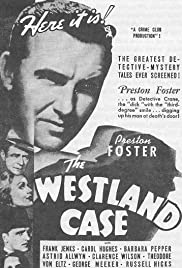
THE WESTLAND CASE
US, 1937, 61 minutes, Black-and-white.
Preston Foster, Frank Jenks, Carol Hughes, Barbara Pepper, Astrid Alwyn, Clarence Wilson, Theodore Von Eltz, George Meeker, Russell Hicks, Selma Jackson, Ward Bond.
Directed by Christy Cabanne.
This is the first of three murder mysteries featuring Preston Foster and Frank Jenks as a private detective and his wisecracking partner. Preston Foster is fond of a drink, is rather wisecracking, gives no immediate sign that he would be a private detective or skilful at detection, but, he does pick up clues, follows them through and eventually solves the case. Frank Jenks does a lot of the footwork, has an eye for the ladies, is also fond of the wisecrack.
This film was followed by The Lady in the Morgue and The Last Warning.
Some of the performances are up and down in this short feature. Clarence Wilson portrays a lawyer whom one would not think of hiring, small, suspicious -looking, infiltrating and insinuating. He is hired by a prisoner on death row, a rather upright man who worked in finance but has been accused of murdering his wife whom he was about to divorce, and to marry a woman associated with his company. She has been found dead in a locked room, the key on the table, he having the only other key.
The film uses the device of a filmed re-enactment of the crime which serves to inform the audience quickly of who the characters are and what has happened.
There is also a femme fatale character, played by Barbara Pepper, looking like Mae West, sounding like Mae West, mimicking all the manner and style of Mae West. The two detectives are attracted to her – but, so is the small lawyer (and he wins out at the end!).
There are also a number of associates of the imprisoned man, all dealing in finance, also suspicious.
While the private detective doesn’t seem to be doing much in his job, he does work out what happened, flies to Illinois with some photos to find out who actually had bought a gun, framing the imprisoned man. There is a showdown, as usual, but it all happens in the prison with only a few minutes before the time for the prisoner’s execution. The warden has been very supportive for the prisoner, not believing him to be guilty – and, accompanied by the chaplain praying, the prisoner is reprieved and released. (The two detectives expect to meet up with the femme fatale but she turns up and is on the way to Florida with the small lawyer!).
The film was directed by Christy Cabanne one of the most prolific Hollywood directors, working from 1913 to 1948, over 160 entries in the IMDb.
Published in Movie Reviews
Published in
Movie Reviews
Saturday, 09 October 2021 13:01
Love Sarah
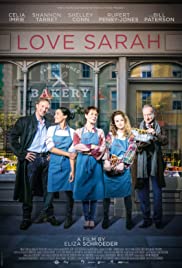
LOVE SARAH
UK, 2020, 97 minutes, Colour.
Celia Imrie, Shelley Conn, Shannon Tarbet, Rupert Penry- Jones, Bill Patterson.
Directed by Eliza Schroeder.
If you have ever dreamed of cleaning up a shambles store-space, setting up bakery with specialised cakes, of opening a tea room, Love Sarah is definitely your film. And if you have never had these dreams, Love Sarah is also a film for you. It has sadness, happiness, cuteness, sentiment, and enthusiasm. By the way, Love Sarah is the name of the tearoom situated in a London suburban street.
At the end of the film, the name of the producing company appears, Femme Films. And that is very true – this is very much a women’s film, the director, the three central characters, men in supporting roles, a paternity question. And all in London, very British, attractive for those who live in London, and an engaging set of memories for those who ever lived there or visited.
The sadness is fairly instant. A woman in her 40s has died. She and her friends had done cooking training in Paris some decades before and were now in a position to set up their own bakery. The three women who loved her are her mother, Mimi (Celia Imrie), her daughter Clarissa (Shannon Tarbert) and her best friend, Isabella (Shelley Conn). They are faced with a challenge and each responds in her own way. Isabella is the driving force but feels she is not expert chef enough for the project. Mimi has been alienated from her daughter and the younger women try to persuade her to become involved. Clarissa, a ballet student, experiences a breakup and moves back with her grandmother.
The performances of the three women are engaging, especially Celia Imrie, a past high-wire artist (who does have a moment to illustrate that even, elderly, she could still pose on the trapeze). Celia Imrie reminds us that she was in the Best Marigold hotels films – and this audience is definitely a target for Love Sarah.
And the supporting men? Rupert Penry- Jones is Matthew, a top chef, who trained with the two women, was in a relationship with Clarissa’s mother, feels the need for something new in his cooking life, wants to be associated with the women again. While he might have had his caddish moments in the past, he is more genial now (as has been Rupert Penry-Jones’? past screen presence, playing a number of cads).
Across the street from the tea and cakes lives an eccentric elderly gentleman, Felix, Bill Patterson. He calls by, watches the shop out his window, attracts the attention of Mimi who discovers he is an inventor, even eager to set up a security system in Love Sarah.
Much of what we might expect from such a scenario takes place: few customers initially, the baking of beautiful cakes (who are very well prepared for their frequent close-ups), visitors, lucky opportunities…
In fact, commendably, the film’s and Mimi’s creative brainwave faces the fact that London is a multi-multi-cultural place in that many who have come to the UK have a yearning for the pastries of the past, their past. And, commercially, this provides a bonanza.
This is definitely a feel-good film and so it ends for each of the characters feeling good – as we do as we leave the cinema.
1. A pleasing British story? The focus on the women? The female director and her sensitivity?
2. The London settings, the many vistas of the city, homes, the streets, Notting Hill, the interior of the shop? The Time Out filming? The musical score?
3. The introduction, Sarah, her relationship with the other women, her untimely death? The consequences? The intentions of starting the bakery? Signing the documents with Isabella? The dilemmas? Clarissa, memories of her mother, deciding to collaborate with Isabella? Clarissa staying with her grandmother, persuading her to invest in the store? The bad memories of the separation between grandmother and mother?
4. Filling in the backgrounds of the women? Isabella, financial world? Wanting to bake, not confident, relying on Sarah? The approach to Clarissa? Clarissa, her ballet training, her boyfriend, his breaking up with her, her moving back to her grandmother’s? Mimi, show business, the trapeze act, the photos?
5. The decision to open the shop? The hard work in the renovation of the store? Matthew and his arrival? His place in the past? The relationship with Sarah? The training to be cooks in Paris? Relationship with Isabella? The paternity issue and whether he was Clarissa’s father? His motivations for coming? Getting the hair, the DNA test? Matthew and Clarissa getting the final information? The importance for Clarissa and her concern about not knowing her father?
6. Matthew and his skills? The audition, the range of cakes? The menu? Customers to drop in? Coffee or tea? The first day, no customers, Felix and his looking in the window, coming in to say hello? The slow drift of customers?
7. The focus on the cakes, the range, beauty, the close-ups?
8. The customer with the child, the discussions about ethnic backgrounds, countries of origin, tastes and cakes? Mimi fostering the idea? The number of contacts, the interrogations, from the Baltic countries, from Asia…? More customers coming? Placing orders, bulk orders?
9. The relationship between Matthew and Isabella, her reticence, his affirming her skills? The night together? Her discovering that the restaurant was headhunting him? The break? Hostility? His apology, the reconciliation?
10. Clarissa and Mimi, maybe going to the dance class, her posing on the trapeze, memories of her past? The discussions between grandmother and granddaughter?
11. The customer, the bulk order? Her being with Time Out, the decision to do a feature, the camera crew coming, the performance?
12. Felix, eccentric, inventor, looking out his window across the street to the shop, visiting, Mimi and the cakes, the flowers, his inviting her out to the opera? A relationship?
13. Clarissa going back to dance classes, Mimi finding new life in the shop, Isabella and Matthew together? A feelgood film – for the audience to feel good as they left the cinema?
Published in Movie Reviews
Published in
Movie Reviews
Saturday, 09 October 2021 13:01
Dogs Don't Wear Pants
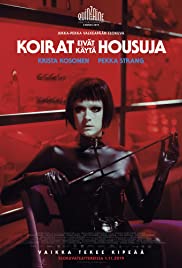
DOGS DON'T WEAR PANTS
Finland, 2019, 105 minutes, Colour.
Pekka Strang, Krista Kosonen, Ilona Huhta.
Directed by J. -P. Valkeapaa.
Two alerts before the review of this film. Firstly, the subject is sado-masochism, the role of a dominatrix and her client, a subject that a number of audiences would prefer not to watch. Secondly, this is an intelligently made film, well-acted and directed, exploring a difficult subject, relationships between the experience of pain and sexuality, offering much to reflect on.
This is a Finnish film, set in Helsinki, a surgeon working in a hospital, living at home with his school-aged teenage daughter. There is a prologue, something of a nightmare, with the surgeon unable to save his wife who drowns. Her death recurs in his nightmares, in his imagination, in his regrets and judgement on himself.
Some years later, he takes his daughter to have her tongue pierced for her birthday. While he waits, he encounters a sado-masochist chamber, and is attacked by the dominatrix, Mona. This stirs something in him. He is not in any personal relationship with a partner, and he returns to an appointment with Mona. She treats him as a dog, on all fours, and he willingly concurs and acts out this game.
On the one hand, the surgeon becomes obsessed with Mona, returning for visits, for humiliation, the beatings, for pain. He becomes more remote with his daughter, not turning up at her band recital, her questioning him. At work, his colleagues are concerned and the authorities asking for a psychological assessment.
On the other hand, the film shows something of the personality of the young woman who is a dominatrix, a graphic scene with another client with candles burning on his bare back, his pain and her having to extinguish them. She allows the surgeon to return, but we see that it has something of a personal effect on her, some emotional response. She indulges the surgeon, especially with scenes of asphyxiation – where he blacks out, is taken to hospital, his daughter coming to visit him, reviving, having to wear a neck brace.
He becomes so obsessive that he waits outside the premises, follows Mona, tries to get into a sadomasochist club but is refused. He follows Mona home, asks her for more pain, and there follows, audiences probably grimacing, some pain with the prolonged extraction of a tooth with pliers.
This seems to bring the surgeon to some kind of decision, to return to hospital, to take his daughter to a Museum. However, he returns to the club – and is absorbed into lights, its music, gyrating dancing, smiling, it would seem, for the first time in the film, seeing Mona and her beginning to smile.
This is not a psychological analysis of sadomasochistic behaviour, rather a portrait, storytelling, for audiences to identify with characters, will be repelled by them, assess their behaviour, needs, motivations. This kind of film could be seen as a cry for help, an out of the depths kind of cry. However, it is also an ‘enter the void’ kind of film, little hope, no way out – and the surgeon, ultimately surrendering to the void.
Published in Movie Reviews
Published in
Movie Reviews
Saturday, 09 October 2021 13:01
Quiet Please, Murder
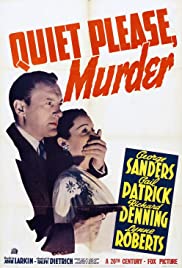
QUIET PLEASE, MURDER
US, 1942, 70 minutes, Black-and-white.
George Sanders, Gail Patrick, Richard Denning, Lynne Roberts, Sidney Blackmer, Kurt Katch.
Directed by John Larkin.
Certainly an effective title for a murder mystery. This is a film of 1942, B-budget feature with a strong cast. It is set in the atmosphere of American involvement in World War II, the fifth column in the United States, hostility towards his day and the Nazis.
Most of the film is set in a library. With the notice, Quiet Please. There is a rather graphic opening concerning a manuscript, original, of Hamlet for the actor Richard Burbage. George Sanders, always suave with immaculate diction, is a collector who then murders the assistant. Not only is he a thief, he is also a forger and reproduces a number of copies for sale. One client is German, played by the sinister Sidney Blackmer, who realises that it is a forgery and confronts Sanders’ associate, an exceedingly self-possessed dealer in forged manuscripts, Myra, played by Gail Patrick. Into the action comes a private detective, played by a pleasantly smooth Richard Denning, who is investigating the forgeries but agrees to help Myra.
Myra does double dealing, clashes with Sanders with a whole lot of discussion about psychology and Freud, plans for a trip to the library, but, at the same time, Sanders has organised an elaborate scheme for further theft of manuscripts. And this includes his impersonating a policeman and having his gang arrived posing as police. Which leads to a number of mistaken identities, murders, betrayals, especially on Myra’s part, a librarian helping the detective… Which defies plausibility.
Not the kind of ending that one might have expected, Sanders being overcome and arrested, Myra pursued by a mute killer, dead in the street.
Different and entertaining to watch.
Published in Movie Reviews
Published in
Movie Reviews
Saturday, 09 October 2021 13:01
Healer, The
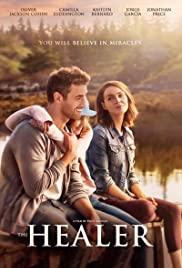
THE HEALER
Canada, 2017, 113 minutes, Colour.
Oliver Jackson- Cohen, Jonathan Pryce, Camilla Luddington, Jorge Garcia, Adrien G.Griffiths, Kaitlyn Bernard.
Directed by Paco Arango.
At first, the title seems quite bizarre. An air pilot whose flight has been cancelled returns home and finds his wife with a local handyman. On his uniform is the title The Healer. It is also the name of the store from which he works. He has a bad reputation, not only with the ladies, but gambling and in debt to Russian thugs. He is Alec, played by Oliver Jackson -Cohen (the mysterious husband in The Invisible Man). Where is this all going?
The answer is: in mysterious directions.
Alec is summoned by a previously unknown uncle (Jonathan Pryce), with a proposal to pay his debts if he moves from London to Nova Scotia for a year – leaving in two days. Reluctant, trying to cash the ticket his uncle gives him, he eventually does arrive in Canada. He is to live in his uncle’s house. He is given a ramshackle vehicle. And he is supposed to get a job. A friendly young woman, Cecilia (Camilla Luddington) is a vet, offers him work – especially when dogs, sheep and other animals instinctively follow him. She places an ad in the paper for him and he suddenly finds clients, not for his electrical skills, but because the advertisement says that he is a healer, will heal anyone.
Thus begins a series of strange incidents for Alec, including a confrontation with the extra-large parish priest, Father Malloy (Jorge Garcia), the priest collapsing, Alec trying to revive him – but two schoolgirls on a video excursion filming it all, it’s looking as if he is murdered the priest, and the video handed into the police who arrest him.
The screenplay does not quite go in expected directions. It seems that Alec has a gift and a destiny – but, will he accept it? Will he fulfil the destiny? A teenager with cancer and insistent parents offer some kind of testing ground.
Alec is a genial person on the whole, despite his disreputable past. His uncle turns up, explains his destiny to Alec, puts the burden of decision on Alec himself.
Audiences may be able to accept the idea of the gift, healing capacities, more readily because the most sceptical person around is Alec himself.
At the end, the writer-director, Mexican Paco Arango, indicates that his concern is actually with seriously ill children. Press information provides details of the work that Arango himself as done with organisations for the seriously ill, dedicating his film to Paul Newman whom he sees as this kind of healer, especially with his devoted organisation for seriously ill children.
There is a pleasant Catholic tone about the whole thing – an enjoyable scene in a London church and a confessional, Alec taking refuge, the parish priest telling him that parable-joke about the person caught in a flood, refusing help from the police, the boat, a helicopter, drowning and then blaming God for not helping him, God explaining that he had sent all the means necessary. On that basis – Alec should go to Nova Scotia.
1. The title? Electrical jobs? The store? The partner and his giving up on Alec? The transition to Nova Scotia, the advertisement, the clients for healing, the revelation of the gift and destiny, Alex choice?
2. The London settings, the home, Alec and his work, with the women, his work, the bar, owing money, the meeting with his uncle the club, the pursuit by the criminals, the refuge in the church, confessional, the encounter with the priest? The musical score?
3. The uncle, wealthy, the invitation, the proposition, paying the debt, Alec going for a year to Canada, the risk? Alec not wanting to go, trying to cash the ticket? The impact of the priest and his story about the man asking for rescue and the appeal to God? God’s answer?
4. The Nova Scotia scenery, the town, the sea, the countryside? Homes, the vet, the church, diners? The musical score?
5. Alec, the house, the ramshackle car? The welcomed by Cecilia? The lesbian issue? the dog following him, getting a job, the sheep following, the birth of the cow and his shock?
6. The advertisement, the wording, the clients in his house, the embarrassment after the cold shower? His declaring he was unable to heal? The reaction of the possible clients?
7. At the diner, the deaf man hearing, his wife’s pain going away, the woman and her blood sugar, her fiance and his stutter? The response to Alec?
8. Father Malloy, at the church, going to see Alec, his collapse, the little girls videoing the situation, Alex thumping the priest’s chest, the wheelbarrow, the back of the truck, delivering him to the church? The police and the video? The hostile policeman – and his earlier giving Alec a ticket because of his parking and drinking? Alec being arrested, in the cell, Cecilia visiting and his resistance?
9. The local police, calling in the authorities, Father Malloy phoning, the embarrassment for the police?
10. His uncle, the basement, the pictures of the previous healers, the explanation of the gift of healing, skipping a generation, the frame for his photo? Cecilia and her family, the help of the generations? The proposition to Alec, his resistance? The time limit, midnight, his contemplating? Going to the church, everybody welcoming him? His refusing the gift – but the people still applauding? Father Malloy presiding?
11. Father Malloy’s story, his loss of faith, the death experience, regaining his faith, urging Alec into the church, but Alec having to do the praying by himself? Alec’s desperate prayer to God, shouting at God?
12. The situation with Abigail, her insistent parents, their driving? Alec and his compromise, Abigail and her vivacious attitude, her cancer? Gratitude towards her parents? Spending the weekend with Alec and Cecilia, with the animals, enjoying their company? Her philosophy of life, description of her illness? The parents happy, the return home? The policeman being her uncle, the reconciliation with Alec?
13. Alec, the experience, wanting to accept the gift, the uncle refusing? Alec finding his picture in the basement?
14. Cecilia, the uncle’s warning, her defence against Alec, yet falling in love? Abigail calling their bluff?
15. Abigail, her phone call, the remission?
16. The plausibility of the gift – or not? And the solution for everyone doing their best to help and support seriously ill children?
17. The background of the director and his charity work, the images during the final credits, the seriously ill children? The tribute to Paul Newman?
Published in Movie Reviews
Published in
Movie Reviews
Saturday, 09 October 2021 13:01
Monos
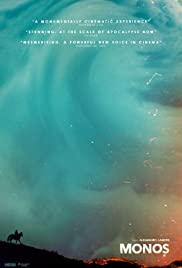
MONOS
Colombia, 2019, 104 minutes, Colour.
Sophia Buenaventura, Julian Giraldo, Karen Quintero, Laura Castrillon, Deiby Rueda, Paul Cubides, Sneider Castro, Moises Arias, Julianne Nicholson, Wilson Salazar.
Directed by Alejandro Landes.
As the audience watches a group of children at the opening of Monos, eight of them, blindfold, playing football, trying to score goals, then seeing them lined up, being drilled, military-like, thoughts about child soldiers and children being exploited by the military readily come to mind. And, with the group of eight, being drilled by a dwarf leader, strict precision, demanding physical exercises, then his departure and their suddenly being let loose and behaving like undisciplined teenagers, perhaps many will think of William Golding’s Lord of the Flies.
And this is not wrong, especially as the scenario unfolds, the interactions of these children with each other, in the war context, their holding a hostage, some battle sequences, and the youngest of the group, nicknamed Smurf, tied up and facing the pig’s head, shown in close-up.
There is some magnificent photography, mountain vistas, then a descent into the lush jungle, rivers and falls.
There is no explicit explanation about the war situation. The group of children are stationed at an outpost, experience an attack, and then have to set up headquarters down-mountain in the jungle. They are guarding a hostage, an American engineer, played by Julianne Nicholson. She is made to participate at times in the activities, photographed with a newspaper to authenticate her capture, then her attempts to escape.
The children are identified visually at first, then by their nicknames which range from Wolf, Dog, Bigfoot, Boom-boom, and three girls, Lady, the young Swede, and the unexpectedly named Rambo. We get to know them, some of them rather well, a crisis after they are given a cow to provide them with milk and in some mayhem, it is shot, and the leader, Wolf, made to take responsibility – even to his death. At times, they have to act like adults. At times, they don’t know how to act as adults.
On the narrative level, the audience is plunged into an unfamiliar world, asked to think about contemporary uprisings and revolutions, especially in Latin America, to think about the exploitation of children in war and the consequences for them.
Towards the end of the film, there are some hints of ordinariness, a couple with children playing, their watching the television, a slight item about making jelly babies in Germany – and then tragedy. There is a helicopter rescue, flying in over the city – and, rather than an ending, the narrative just stopping at a crucial moment, challenging the audience to reflect on what they have seen and felt, and what they might anticipate for the future.
(Mono is Spanish for monkey – and Monos, is Spanish slaying for “how cute!�.)
1. Title? The Spanish for monkeys? Spanish Spain, “how cute�?
2. The Latin American setting, Colombia, the mountain scenery, the jungle scenery, rivers and falls? Beauty and violence? The musical score?
3. The references to Lord of the Flies? Group of youngsters? On their own? Discipline? Falling apart? In the context of war? Child soldiers? The exploitation of children? The consequences?
4. The introduction to the group, the dwarf leader, his demands, discipline? Military? The exercises, drills, the soccer with blindfolds, the exercise regime? Permissions to speak? Permission for Wolf and Lady to be partners? The role of the group in war? Child soldiers, preteen, teenagers? Holding the fort? The Doctora as prisoner? From America? Engineer? Speaking English, Spanish?
5. The leader, the drills, his going back to headquarters, radio connection, his orders?
6. Doctora, her presence, capture, treatment, alone, the food, the group guarding her? The photos, her reading the paper, information from her captors? Her continued participation with the group, their making demands on her, her wanting to escape?
7. The range of personalities in the group, Wolf as leader, his relationship with Lady, his responsibilities? The issue of the cow, the mayhem and Dog shooting the cow, Wolf having to take responsibility, digging the hole, covering it? His death? Lady and her role with the group, her age, sexual experience, the further relationship with Bigfoot?
8. Bigfoot, small, leadership and responsibility, erratic mood, the reactions of the others in the group, Dog, warrior, slow-witted? Boom-boom as the favoured soldier? Smurf, his age, imposing responsibilities on him? Rambo, a girl, warrior? Swede, young, her keeping guard on the Doctora, fears at the invasion, taking refuge with the doctor, the doctor’s response?
9. The issue of the cow, the milking, responsibilities, the cow shot dead, dragged, cut up for meat, the group eating?
10. The aftermath of the drill, not supervised, behaviour falling apart, childish, reckless? Drinking? Some mayhem?
11. The invasion, the battle, black-and-white night photography? The effect on the group?
12. The transition to the jungle, setting up the centre, Bigfoot in charge? The place of the doctor, her attempts to escape, in the river, on the bridge, captured again, her being chained? Smurf and his being tied up, wanting to leave with her?
13. The children painting themselves, echoes of Lord of the Flies, the pig’s head and its standing facing Smurf?
14. Rambo, her treatment by a Bigfoot, her escape, down the river and the falls? Bigfoot pursuing her? Her finding the children playing, the husband and wife watching the television, the slight programs, the making of jelly babies in Germany? The information about the uprising? The invasion, the shooting of the parents, the children hiding? Rambo, the boat, later in the flood, face down on the sand, the helicopter rescue?
15. The doctor, news of her being sighted, escape?
16. The fate of the other children? The continuation of the war? The exhortation of the child soldiers? Rambo sitting in the helicopter and the military asking for orders as to how to deal with her? Her future?
17. The group of children as metaphor for contemporary society?
Published in Movie Reviews
Published in
Movie Reviews
Saturday, 09 October 2021 13:01
Fisherman's Friends
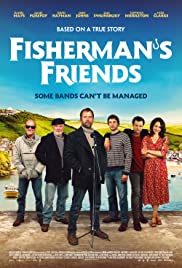
FISHERMAN’S FRIENDS
UK, 2019, 112 minutes, Colour.
Daniel Mays, James Purefoy, David Hayman, Sam Swainsbury, Dave Johns, Maggie Steed, Noel Clarke, Christian Brassington, Vahid Gold, Tuppence Middleton.
Directed by Chris Foggin.
There’s nothing like an old sea shanty, “Way there, and up she rises…�, “… Bound for South Australia�. And, we are treated to a succession of full-throated shanties, sung by a male choir. This is the story of the choir.
And, it is a true story. As with so many true stories these days, we are treated to photos of the actual characters during the final credits – and with some information about the men, their singing, their success, their tours, their charity fund-raising.
The setting is Cornwall – and, later in the story, when the fishermen are booked to sing the national anthem for the Queen’s Birthday, they sing their Cornwall anthem! On the south-western tip of England, home of smugglers and independent characters, Cornwall is unique.
Whether the earlier part of the plot really happened, not too sure. A group of Londoners come down for a holiday before a wedding. They are part of a recording company. Out on the sea, they have to be rescued by the fishermen and, as they go, hearing the songs in the local pub, they trick their contract agent, Daniel (Daniel Mays) into thinking he has to sign them up for a record deal. (There are some nice comeuppance grimaces at the end of the film when they realise they have failed and Daniel has succeeded!)
In fact, the fishermen, about 10 but various men moving in and out of the group, rehearse, sing in the pub, have some singsongs for the locals and for tourists. They are, actually, very good – and it is they who sing throughout the film. There are some rough diamonds in the fishermen, led by Jim (James Purefoy), his old father, who is now a great-grandfather (David Heyman in his most sprightly role), Dave Johns (who made such an impression as I Daniel Blake) and Sam Swainsbury is the younger member who owns the local pub but who has a new baby and a lot of debt and needs to sell the pub (leading to some non-choir issues when Daniel mediates and the pub is sold to a property developer), the locals not too happy at all. Maggie Steed (older audiences remember her on TV in Pie in the Sky) is the matriarch working in the pub.
Daniel does his best, recording out in the open but disturbed by the seagulls, one of which is shot down by flare, a bit like the Ancient Mariner’s albatross. They do better in the church with its fine acoustics and out goes the record album to the companies. Daniel in the meantime, falls in love with Jim’s daughter and her daughter – not so nice a man at the beginning but transformed by his fishermen’s experience.
There is an enjoyable visit to London, an impromptu audition, singing at a highfalutin wedding with the guests taken aback, the episode with singing the Cornwall anthem. And, these days, what does it! Youtube of course, millions of hits – and who, in the business, can resist this kind of popularity? Happy to say that the hotel issue is solved by Daniel’s self-sacrifice, the album breaks into the Top 40 at ninth place and Bob’s your uncle!
Not only a feelgood film, a look-good film, and a fine sound-good film.
1. A true story? The photos during the credits? The songs from the group in the soundtrack?
2. A story of Cornwall, vigorous citizens of Cornwall, the visuals, the town, the water, the shore, the cliffs? Homes? The pub? The church? Atmosphere? The contrast with London, streets and traffic, the pubs, the studios, flats?
3. Sea shanties, the range of songs, the arrangement, the men and their voices?
4. The town, the community, friendships, the pub as centre, the singing, the men themselves, for the public, their work as fisherman, out on the boats, the rescue work? The range of men, the ages, characters, gruff, humour?
5. Troy and his friends, coming to Cornwall, arrogant attitudes, preparation for the wedding, going into the water, the need for rescue? Tricking Dan? His believing them? The phone calls? The hostility of Troy and his company against the men? Yet the singing at the wedding, people’s shocked reaction? The father in law and the deal with selling the pub? Business, trends, ruthlessness, rivalries?
6. Daniel, character, manager, contracts, believing his friends, leaving him stranded? The one-way street, the confrontation with Alwyn? His attraction to her?
7. Rohan, the pub, wife and child, the need for money, the explanation of the origins of the pub in the past, the pub and the workers, Maggie a strong presence, the customers, the drinking, the Trivial Pursuit games, fights?
8. Daniel and his change, the bed-and-breakfast, the continued to attraction to Alwyn, comfortable with her daughter?
9. The men, Jim as leader, with Alwyn, granddaughter? Jago, cheerful, rough, great grandfather? The other members of the group? The public singing?
10. Daniel, not so nice, the possibility of the contract, giving his word, the humour of the wake-up call and his going out on the boat, being sick? Jim agreeing? The hopes?
11. The recording session, in the open, the gulls and the dead gull, the curse, going to the church, the acoustics, success, sending the album to the agents?
12. The wedding, their being booked, singing, the reaction of the guests?
13. Going to London, the bus, the pub crawl, stranding Daniel, going to the audition, the reaction of the people in the office, Leah and her refusal, the reasons, the rivalry with Troy and his company? Disappointment? The girl from the office, suggesting they sing the anthem for the Queen’s Birthday?
14. Singing, television, the Cornwall anthem, reactions, Youtube, the number of hits, Leah and her phone call, Troy and his being upset?
15. Jago, his death, the sadness of the funeral, on the boat commemorating him?
16. Daniel, the bond with Alwyn, with her daughter, Jim and his suspicions? The night together? Living together?
17. The issue of the sale of the pub, Jim not knowing, Rohan telling the truth, Jim and his anger, Alwyn blaming Daniel, cutting him off?
18. His visit to London, sacrificing his flat, buying the pub, his return? The gradual acceptance?
19. Listening to the news, the top 40, the fishermen coming in ninth? The reconciliation? In the car going out to sea…?
20. The credits, the story of the men and their success, tours, charity work? A feelgood experience?
Published in Movie Reviews
Published in
Movie Reviews
Saturday, 09 October 2021 13:01
Agatha Christie's Poroit Adventure of the Egyptian Tomb
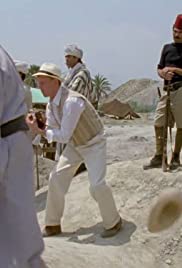
THE ADVENTURE OF THE EGYPTIAN TOMB
UK, 1993, 50 minutes, Colour.
David Suchet, Hugh Fraser, Pauline Moran, Rolf Saxon, Olivier Pierre, Jon Strickland, Bill Bailey, Paul Birchard, Simon Cowell- Parker, Grant Thatcher, Anna Cropper, Peter Reeves.
Directed by Peter Barber Fleming.
This is a later episode in the short stories section of the television series of Agatha Christie’s Poirot, with David Suchet as Poirot.
Agatha Christie had a connection with excavations, with her husband, and such stories as Murder in Mesopotamia. The location for these Egyptian locations in the Valley of the Kings is actually Spain.
The film draws on the popularity of the excavations by the British and the Americans in Egypt’s, the opening up of tombs and the revelations, and mysterious deaths and the popularity of imagining curses.
There are several deaths and the widow of the chief excavator asks Poirot to investigate. He and Hastings go to Egypt. There is a mysteries of several deaths at the excavations site. There is also the suicide of a young man in New York. Poirot and Hastings go to Egypt, there are more deaths – but Poirot gathering the group together, unmasking the killer and explaining his motivations (which do seem to be a bit far-fetched even though the killer himself is comparatively nondescriptive compared with other villains in Agatha Christie mysteries.
1. Polarity of Agatha Christie mysteries? The television series with David Suchet as Poirot?
2. The London settings, the block of flats, Poirot’s office? The visit to the Woolard estate?
3. The contrast with the sequences in Egypt, the excavations, the archaeologists and the workers, the opening of the tomb, the interior of the tomb? The camp, the details of life at the digs, Poirot, Hastings in the tent? The visit to the United States? The young man, his apartment, his death? The musical score?
4. The opening of the tomb, Sir Jon and his impatience, imperious in manner, his collapse? The continued focus on the statutory? The possibilities of a curse? His wife, consulting Poirot, the hostility of Guy?
5. Hastings in America, the visit to Rupert, his gloved hands, upset? Hastings return, finding Rupert dead? The suicide in the note?
6. The further deaths at the digs, tetanus, infections, harsh deaths? Dr Ames and his having to treat all those who are sick? His background, the group of young men being at Yale?
7. Poirot and Hastings, going to Egypt, the tent, accommodation? The investigations? The deaths? Ames and his illness? The warning from the servant? Guy and his presence, apprehensive, in charge of the excavations? Poirot and the suggestions about the curse?
8. Poirot, his investigations, the cabinet, the medications? Poirot, the drink, his collapse, only pretence?
9. The gathering of the group, the British archaeologists, the American archaeologists, Poirot and his explanation? The revelation that the doctor was the murderer, the gun, his being overpowered? The explanation of his motivation, the death of the uncle and his leaving his money to his nephew, persuading Rupert that he had leprosy, the depression leading to suicide, and Rupert grateful for the doctor saving his life in the past, naming him in his will?
Published in Movie Reviews
Published in
Movie Reviews
Saturday, 09 October 2021 13:01
Agatha Christie's Poirot Adventure of the Cheap Flat
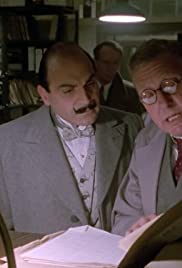
THE ADVENTURE OF THE CHEAP FLAT
UK, 1990, 50 minutes, Colour.
David Suchet, Hugh Fraser, Philip Jackson, Pauline Moran, Samantha Bond, John Michie, Jemma Churchill, Peter Howell, Jennifer Landor, Ian Price, William Hootkins, Anthony Pedley.
Directed by Richard Spence.
While this is a London story and the cheap flat is not cheap but inexpensive, is also a film about military espionage, the Mafia, assassins and an FBI agent, extremely bunches (William Hootkins) coming to London, taking over chief Inspector Japp’s office, considering Poirot just as a gumshoe and not having a high opinion of them.
There is initial suspicion on a young couple who get the cheap flat while others have been rejected. However, Poirot with some research and nightclub interviews by Miss Lemon, Hastings inevitably helping but misunderstanding, the culprit who has not only stolen important plans but has killed someone, is tracked down to a London nightclub, the American assassin following, the FBI having a stakeout. The case is solved by Poirot, who has gone initially to the movies to see G-Men? with Hastings and chap who enjoy it immensely, with Poirot did testing the violence.
1. The popularity of Agatha Christie mysteries? The television series, 70 episodes, the short story? David Suchet as Poirot?
2. The London setting, Poirot at home and at work, Hastings accompanying him and theorising, helping out in crises? Miss Lemon, at home, her posing as the journalist?
3. A London story, the young Robinson couple, the woman refused the flat, the Robinsons accepted? Their being set up, target for the American Mafia?
4. The atmosphere with the gangster films, the FBI, the excerpt from The G Men, Japp and Hastings enjoying it and the excitement, Poirot closing his eyes? His reaction to guns in the street? American law?
5. The irony of the FBI agent, dominating, obnoxious, putting down Japp, calling Poirot a gumshoe? Taking over the office, the stakeout? His being one-upped? His acknowledgement at the end?
6. Poirot, investigating the mystery, the story of the stealing of the documents, the Mafia (and the FBI denial of organised crime in the US)? The singer, her background, in the United States, seducing the official, shooting him? Betraying the Mafia? Her fleeing to England? The Mafia sending a killer after her? Her setting up the Robinsons, her name being Robinson, targets?
7. Hastings and Poirot, meeting the Robinsons, their story, Poirot curious, examining documents? Inspecting the apartment, taking it, the exit for the bins, access to the Robinsons? His using it while they were at home? Examining the setup? Suspicions on them at first?
8. Miss Lemon at the nightclub, the interview? Identifying the singer as the killer? Poirot and his visit, the awkwardness of the manager?
9. The visit, the performance, the singer and her henchmen, the confrontation in the dressing room? The FBI and surveillance? The killer keeping vigil at the apartment?
10. The confrontation, the gun, the irony of Poirot removing the bullets, the arrest? Poirot solving the mystery, and achieving everything without having had recourse to gunfire?
11. Poirot being measured for his suit, the tailor, increased measurements, the humour?
Published in Movie Reviews
Published in
Movie Reviews
Saturday, 09 October 2021 13:01
Agatha Christie's Poirot Dead Man's Mirror
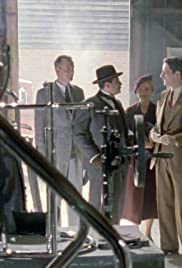
DEAD MAN’S MIRROR
UK, 1993, 50 minutes, Colour.
David Suchet, Hugh Fraser, Philip Jackson, Iain Cuthbertson, Emma Fielding, Fiona Walker, Zena Walker, Richard Lintern, Jeremy Northam, Tushika Bergen.
Directed by Brian Farnham.
The mirror of the title is in auction, Poirot bidding, but outbidden and rather irritated, especially with the manner of the buyer – who then invites Poirot to come to his house to investigate a fraud. Meantime, the audience has seen a young man and woman secretly marrying, and being observed by an older woman.
Poirot and Hastings go to the mansion of the bidder, finding an entrepreneur with the arts, meeting his research assistant, Miss Lingard. The entrepreneur’s nephew, Hugo, an early role for Jeremy Northam, is in love with a young woman, Susan, Tahika Bergen. In the house is the entrepreneur’s wife, who is caught up in the occult, hearing voices from an ancient Egyptian, prophesying that there would be a death in the house. There is also the entrepreneur’s ward, Ruth, whom the audience has seen at the wedding – and her husband is an architect whose company the entrepreneur wants investigated by Poirot.
The entrepreneur, Iain Cuthbertson, is a most unpleasant demanding character and is found dead, seeming suicide, but inconsistencies with his left hand with the gun, the seeming bullet hole in the mirror that Poirot had wanted. With some explanations about the ward, the entrepreneur wanting his nephew to marry her, a signed will, an unsigned will, audiences may well quickly work out who the murderer is and why. However, there is the usual unmasking by Poirot – and some complications with the how the murder was done.
1. The popularity of Agatha Christie mysteries, the television series, David Suchet as Poirot? Assisted by Hastings and Chief Inspector Japp?
2. The title, the opening with the auction, Poirot’s determination, £100? The rivalry, outbidding? His dislike of the buyer, the discussions, the invitation to his house? Poirot irritated? deciding to go?
3. The impact of Gervaise Chevenix? A haughty manner, art dealing? His office, the range of paintings, Miss Lingard as his investigator? His manner, dealing with his family? His will, the change of will, unsigned? His death?
4. Poirot and Hastings, the encounter with Hugo, and the drive to his factory, his skill and inventions, need for money? Chevenix his uncle? His demand that Hugo marry Ruth? Susan on the train, the conversations with Poirot, her hatred of Chevenix? Her wanting to marry Hugo?
5. At the estate? The encounter with all the characters? The rule of the gongs? Some hearing the first gong, others not, including Poirot? Chevenix late for the meal? His wife and her concern – and her occult practices, hearing the voices of the Egyptian, that there would be death?
6. The discovery of the body, shot, the locked room? The gun in the left-hand? The mirror with the hole? Poirot noting the inconsistencies? The loose latch on the window? Ruth and her search for her brooch, the footsteps in the mud, the mud on her dress as all were assembled?
7. The audience having seen the architect marry Ruth, secretly, removing her ring? Observed by Miss Lingard? The secrecy, her intention to tell Chevenix?
8. Chevenix and his asking Poirot to investigate the fraud, his suspicions of the architect?
9. The Chief Inspector arriving, the quick conclusion that the case was suicide? Listening to Poirot, raising other questions?
10. The visit to the architectural firm, the shabby building, the fire, the rescue of the architect, the explosion? His going to hospital? His ambitions, his partners stealing the money? His setting the fire? Ruth coming to visit him, the revelation about the marriage?
11. The visit to Miss Lingard, her contemplating the picture of the mother with the child?
12. The assembly? The explanations by the butler? Poirot and his making a case for all of them to be guilty? Ruth seen as guilty, being arrested?
13. The setup, the mysterious voice, the widow and her following the voice? The exposure of Miss Lingard?
14. The previous explanation about Ruth, the typist mother, Chevenix’s brother, Chevenix taking her as his ward, his wanting her to marry Hugo? Miss Lingard revealed as the
mother?
15. Once again, the least likely suspect, but sufficient clues about Miss Lingard being the mother? But the intricacy of the issue of the locked door and her escape, the bullet hitting the gong, the difficulties with the time situation, the bullet and the cufflink?
Published in Movie Reviews
Published in
Movie Reviews